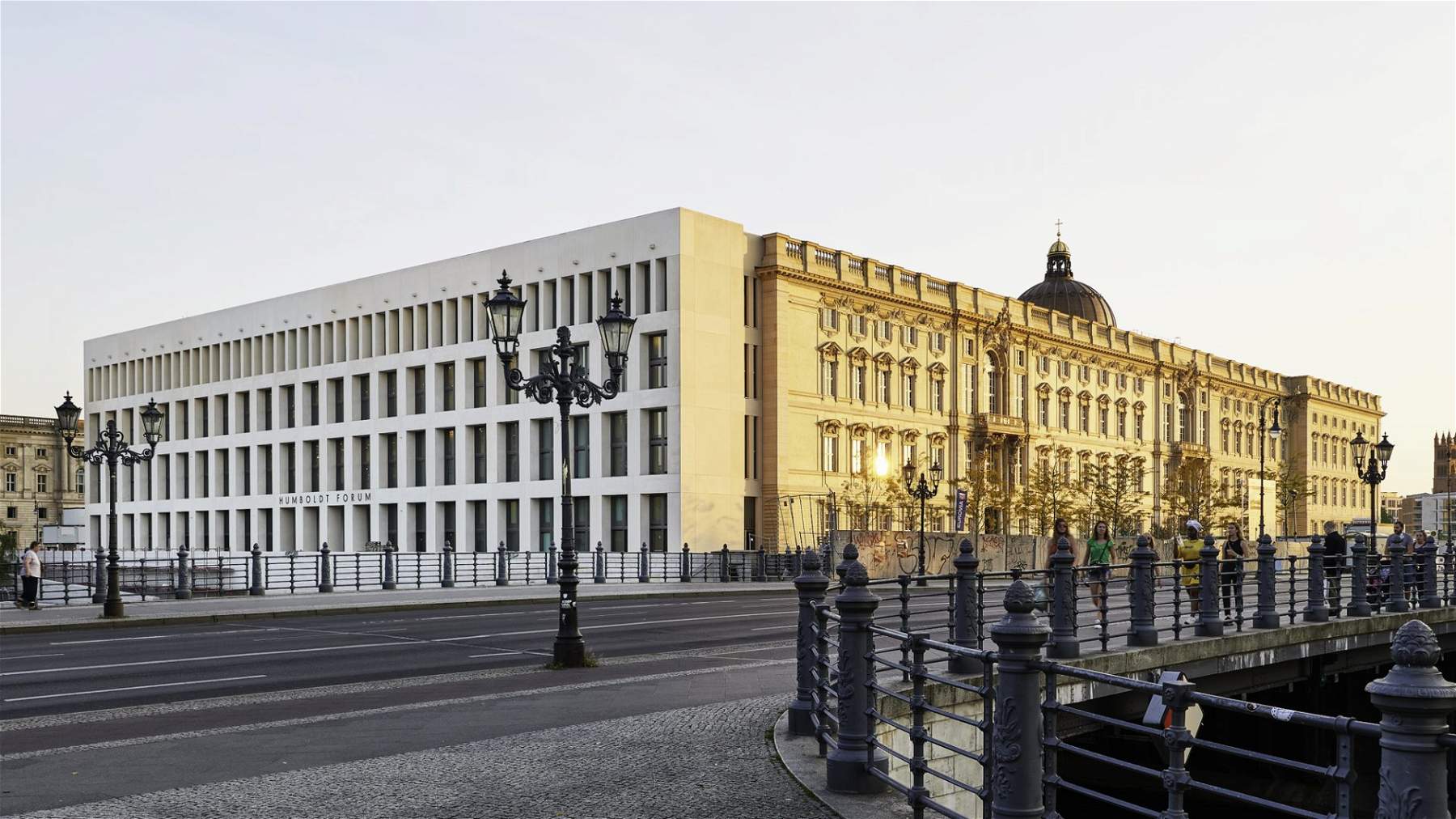It officially opened on December 16 (though only digitally, given anti-Covid restrictions) theHumboldt Forum, Berlin ’s new, large museum housed in the rebuilt Berliner Schloss, the Berlin Castle demolished at the behest of the GDR in 1950 and which was rebuilt precisely with the intention of making it one of Europe’s largest museums: the institute, named after brothers Alexander and Wilhelm von Humboldt (the former one of the best-known geographers and explorers of the 19th century, the latter a philosopher, linguist and diplomat), houses the collections of two museums, namely the Berlin Ethnological Museum and the Museum of Asian Art. It is already considered, due to the vastness and importance of the collection, a kind of “German British Museum.”
It took more than ten years and an expenditure of 680 million euros to realize, and there is also a bit of Italy in the project, because the building was was designed by Italian architect Franco Stella (Thiene, 1943), who had to work on an “obligatory” reconstruction (in fact, the German Parliament decided in 2002 to rebuild the Berliner Schloss “as it was where it was”), adding, the architect said, the “optional” reconstruction of the “three Baroque portals of the western court and that of the facade of the 19th-century dome and its completion with lantern and cross, in the name of the principle that all buildings reconstructed in volume should also be reconstructed in facade, because with omissions of form is often accompanied by the loss or misrepresentation of their original meaning, that is, of the very reason for their reconstruction.” New construction was then added to the reconstruction, namely five new bodies, one outside in the area of the late Gothic and Renaissance factories of the Castle, and the others in the area of the main court, the Schlüter courtyard (these are four new bodies that complete the court as if it were a square).
The Humboldt Forum presents itself as “a place with a relevant past, a place for the arts and sciences, for exchange, diversity and multiplicity of voices, a place where differences come together.” Inside, objects from around the world are on display: totems from America, treasures from ancient China, African sculptures, as well as works from the Berliner Schloss’ ancient sculptural apparatus that survived demolition, all displayed on a 30,000-square-meter exhibition area. There has been no shortage of controversy surrounding the project, both with regard to the construction phases of the building itself and with regard to the exhibits, given the heated debates about cultural decolonization (much of the Humboldt Forum’s collections are indeed from the colonial era). Among the disputed objects are also the famous Benin bronzes for which Nigeria in 2019 formally requested their return to Germany: they are part of the Ethnological Museum’s collection.
“There has been a lot of controversy around the project,” the director, Hartmut Dorgerloh, an art historian, told Artnet News magazine. “I think it’s good, we need open spaces for open debates, it’s something we need today even more than five or 10 years ago. We need social cohesion.” On the disputed objects, Dorgerloh openly states that the responsibility for the eventual return lies with the Cultural Foundation of Prussia, which manages the Ethnological Museum’s collections, and that in any case, themes such as their provenance, the invasion of the Kingdom of Benin, and other historical contingencies related to the arrival of the bronzes in Germany will be “central,” Dorgerloh stresses, and will be told through various positions and various viewpoints in the bronzes’ display at the Humboldt Forum. “Our most important self-description,” Dorgerloh added, “is the word ’forum.’ It is like a market place, where people can meet, talk, see, observe, buy. It is a new concept compared to the time when the reconstruction of Berliner Schloss was decided, more than two decades ago. The mode at that time was different. Colonialism was not at the center of public discussion as it is now.”
There are four institutional partners in the project: the Berlin State Museums (which is responsible for managing the collections), the Berlin Kulturprojecte (the latter will be in charge of developing the exhibitions and events), the Humboldt-Universität zu Berlin, or Humboldt University Berlin (which will work on research), and the Stiftung Humboldt Forum, the foundation that will manage the museum. It is scheduled to open to the public in spring 2021 (the exact date has not yet been announced), with a number of exhibitions: Impressions will delve into the figures of Alexander and Wilhelm von Humboldt; Have a Seat will be a children’s exhibition devoted to cultural diversity; Change in Perspective will be a video art installation in the Schlüter courtyard; and After Nature will be the inaugural exhibition of the Humboldt Lab, and will be devoted to climate change. Then there will also be a focus on the sculptures of the Berliner Schloss and an exhibition devoted to the surviving remains of the ancient castle, visible in the basement of the Humboldt Forum. For information or to plan your visit, however, you can visit the Humboldt Forum website.
 |
| A huge new museum is opening in Berlin: the Humboldt Forum. It is Germany's "British Museum" |
Warning: the translation into English of the original Italian article was created using automatic tools. We undertake to review all articles, but we do not guarantee the total absence of inaccuracies in the translation due to the program. You can find the original by clicking on the ITA button. If you find any mistake,please contact us.